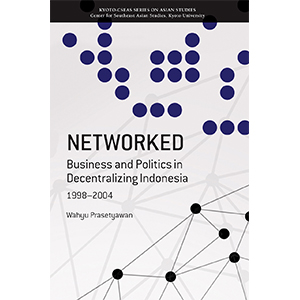Networked: Business and Politics in Decentralizing Indonesia, 1998 – 2004
After the fall of Suharto in Indonesia in 1998, the new government under B.J. Habibie introduced a decentralization policy that dramatically changed relations between the central and local governments. Under decentralization, local governments engaged in bureaucratic and political conflict with the central government over control of natural resources and fairer distribution of rents from these resources. Local elites demanded greater involvement in shaping economic and political institutions. Decentralization is among the most important political economic developments in Indonesia over the last thirty years.
This book evaluates three cases (in the provinces of East Kalimantan, West Sumatra, and Riau) of deep-seated political conflict and intrigue implicating central government, local governments and multinational companies. The author’s analysis shows how competition to manage and control Indonesia’s vast natural resources is no longer limited to national level interests, nor can it be restricted only to the local level. The study elucidates changes in the structure of the national political economy as the result of deep engagement of local actors in disputes with the central government over control of natural resources. These changes will mean new patterns of distribution of natural resource rents, with implications for Indonesia’s evolving democratic politics and modes of governance. The study is also relevant to investors and resource industry players trying to understand Indonesia’s political economy.
Description
After the fall of Suharto in Indonesia in 1998, the new government under B.J. Habibie introduced a decentralization policy that dramatically changed relations between the central and local governments. Under decentralization, local governments engaged in bureaucratic and political conflict with the central government over control of natural resources and fairer distribution of rents from these resources. Local elites demanded greater involvement in shaping economic and political institutions. Decentralization is among the most important political economic developments in Indonesia over the last thirty years.
This book evaluates three cases (in the provinces of East Kalimantan, West Sumatra, and Riau) of deep-seated political conflict and intrigue implicating central government, local governments and multinational companies. The author’s analysis shows how competition to manage and control Indonesia’s vast natural resources is no longer limited to national level interests, nor can it be restricted only to the local level. The study elucidates changes in the structure of the national political economy as the result of deep engagement of local actors in disputes with the central government over control of natural resources. These changes will mean new patterns of distribution of natural resource rents, with implications for Indonesia’s evolving democratic politics and modes of governance. The study is also relevant to investors and resource industry players trying to understand Indonesia’s political economy.
Publisher: NUS Press
Paperback
2018
ISBN: 9789814722971

 Dancing The Malaysian
Dancing The Malaysian
 Footsteps
Footsteps





